Got a Story or News to Share? Submit your info in Contact Us.
News & Stories About Delaware And Education
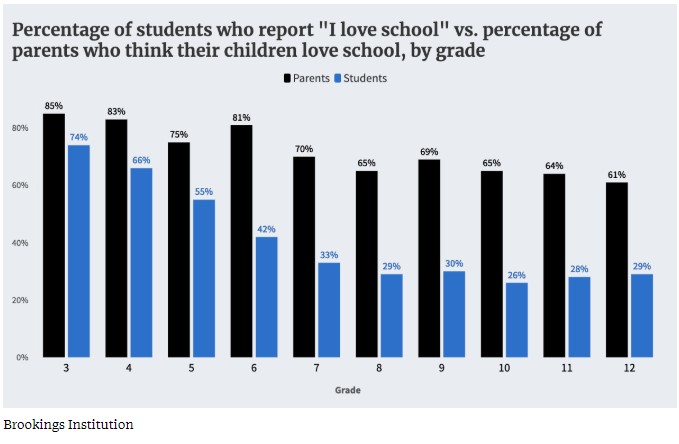
Brookings chart above: black are parent responses; blue (or lower bars) represent student responses. At bottom are grades starting with 3 on left to 12.
Study finds parents and their kids have different views of the quality of school learning
Brookings Institution finds a disturbing disconnect between K-12 students and their parents: Kids report they get less out of school as they get older, but their families think they “love” going to school, writes The74’s Kevin Mahnken.
The article notes that alternative schools may suit older students better.
Rebecca Winthrop, the report’s lead author and a Brookings senior fellow, said “Whatever model you look at, if it gives kids more autonomy — holds them to strong standards, but also gives them freedom to apply what they’re learning in the real world — those kids become unstoppable, and they love school. So I think this is a design problem at its core.”

Education task force to provide policy advice to governor-elect
On Dec. 3, 2024, Gov.-elect Matt Meyer’s education task force focused on teacher retention, the school funding formula, offering more student services, and the need for more DEI as priorities.
Removing barriers for people to become licensed educators could address the teacher shortage, said Shawn Jegede, vice president of the Brandywine School District school board.
“I’ve heard reinvent the wheel. I’ll be honest with you, if you want to fix things, go back to the basics, and become great at the basics. Stop overcooking this stuff,” said Sen. Eric Buckson, R-Camden.

50 schools in Delaware on improvement plans
The state revealed the latest list of state-monitored schools that are consistently underperforming.
Check to see if your children or grandchildren attend any of these schools. The improvement plans must outline the steps the school will take to sustain student achievement and be removed from the list.
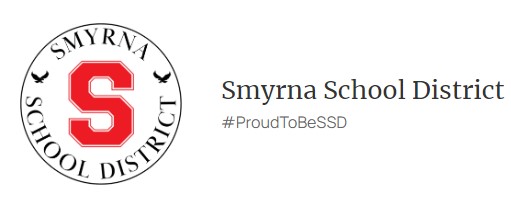
Smyrna School District Superintendent resigns effective January 1, 2025
The Smyrna School District Board of Education accepted the resignation of Superintendent Dr. Susan Brown, effective January 1, 2025.
Dr. Brown stated that she was stepping down for personal reasons. She was named superintendent in 2022.
You can read the joint statement from the Smyrna School Board and Dr. Brown here.
Employees charged with abuse of special ed students at Smyrna Elementary
Three staff members are facing misconduct charges involving their treatment of special needs students in a Smyrna Elementary classroom in November 2024. The school district also faces a civil suit.
(Delaware Online)

Christina School Board exploring use of reassessment tax dollars in lieu of referendum vote
At the December Christina School Board meeting, district CFO Bob Vacca said he felt the combination of the increased assessed values and decreased tax rate could still bring 5-10% more to the district, roughly the amount that most referendums request.
The Board had previously set March 12, 2025, as the date to hold a referendum. With this new information, they will be holding a session on January 7 to make a decision on whether the March referendum is needed .
READ MORE (WDEL)

Prominent Delaware educator Ron Russo has died
Ron Russo was a prominent and passionate voice in the education reform of Delaware schools. He passed away December 16, 2024 at age 79.
Russo ran two successful schools – St. Mark’s High School and the Charter School of Wilmington – using his philosophy that education is a business and teaching is a profession.
His views on this approach are worth considering since they’ve worked twice before and making tweaks to Delaware’s current public school system do not seem to be improving education for students.
To learn more, check out his website:

Catholic Diocese of Wilmington publishes opinion piece from Citizens for Delaware Schools
This editorial makes the case why failing public education is an issue that affects all of us, even those who opted out of the public school system.
Improving education places all children within reach of the potential God has given to each and every one of them.

Citizens for Delaware Schools sponsors Urban Promise banquet
Citizens for Delaware Schools was proud to be a sponsor of Urban Promise’s annual banquet. Heartwarming stories of lives changed by a consistent presence of a supporting community.
Urban Promise Wilmington equips urban children and young adults with a Christ-centered education focused on academic achievement, life management, personal growth and servant leadership.
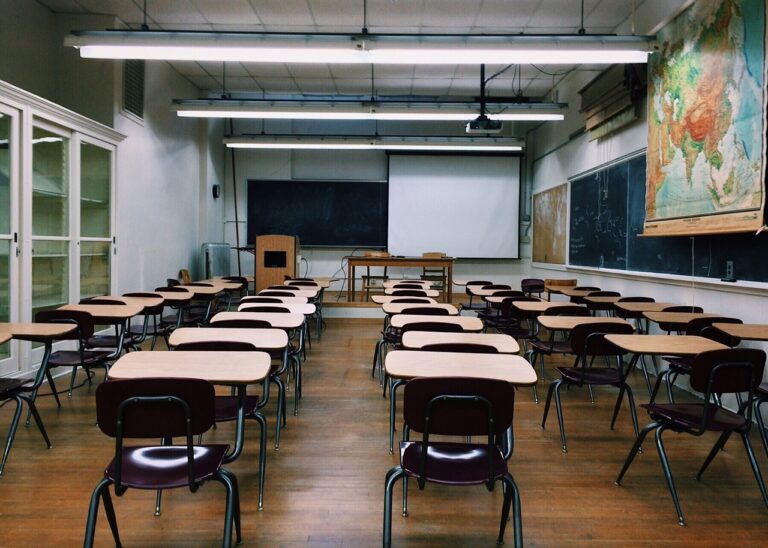
Investigative report shows deferred school building maintenance statewide growing
School buildings are not the sexiest topics when it comes to education but there’s no question they are important to providing a safe learning environment.
Spotlight Delaware, a relatively new local news source on the scene, does a deeper dive into the unmet maintenance needs for aging schools. Brandywine has the greatest number of needs, followed by Woodbridge, Indian River and Seafood.
READ MORE HERE (Spotlight Delaware)

Red Clay board creates committee to solve A.I. DuPont High School's declining enrollment
Nov. 20, 2024
Previous efforts to address low enrollment issues at the high school have fallen short so a new committee was formed to come up with other solutions and present their recommendations by July 2025.
One recommendation to be considered: a ‘secondary attendance zone’ that would equitably distribute students across high schools.
The WDEL article notes that one reason for the decline is parents moving their kids to charter and ‘choice’ schools that are achieving better academic performance.
Read Sean Greene’s article at WDEL
View 2023 statistics for A.I. duPont High school

America First Policy document gives insight to education focus
Giving parents more control over their children’s education is the primary stated goal of the America First education agenda. Specifically, the four pillars are:
1. Allow parents to select the school their child attends.
2. Give parents the right to see all curriculum materials in every class their child attends.
3. Encourage schools to each basic skills that prepare students for life as an adult.
4. Advocate for teaching the truth about America’s history
You can download the section for future reference by going directly to the AFP education agenda.
America First Policy Education Agenda
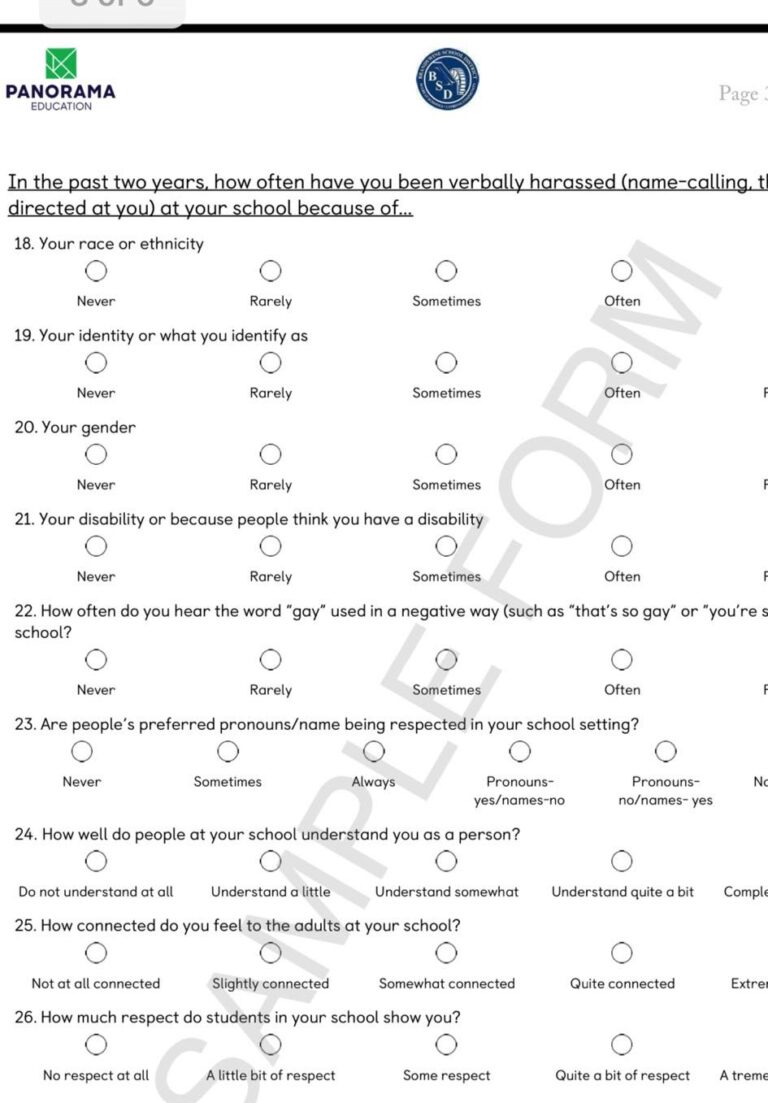
Brandywine School District surveys kids on equity and well-being
Many school districts use Panorama surveys to assess student views as part of their social emotional learning (SEL} efforts. BSD’s fourth- and fifth-graders are asked about the feelings about being at school and their teachers. Grades 6-12 are asked questions in the graphic above, and more direct questions about their mental health and whether they want help or “already receiving care”.
All parents should be aware of these questions and be able to opt out prior to their children participating. These questions ought to be asked by parents.

Opinion: Shifting the Narrative From Chronic Absenteeism to Chronic Attendance
By Devin Gross & Terence Johnson
The views expressed here are those of the authors.
The authors discuss the innovative way they are using a nonpunitive approach toward combatting chronic absenteeism in a charter school network that serves primarily low-income Black and Hispanic students. Their California charter school network is piloting an approach involving data analysis, family outreach & Mystery Fridays.
READ THEIR COMMENTARY ON THE 74

Delaware Student Behavior and School Climate group issues final report
Delaware Student Behavior and School Climate 24-memberTask Force concluded its work with 48 recommendations to improve the school climate. They ranged from actions already implemented but needing refinement to others that are governed by regulations.
The final report now goes to the General Assembly by Nov. 1, 2024.

Research shows teacher's union support helps school board candidates
A national survey shows that potential voters are significantly more likely to favor a school board candidate backed by teachers or a local teachers union.
Although local teachers’ associations are known for their ability to get out the vote, the researchers say their endorsements also appear to be popular with the electorate.
Kevin Mahnken, The 74
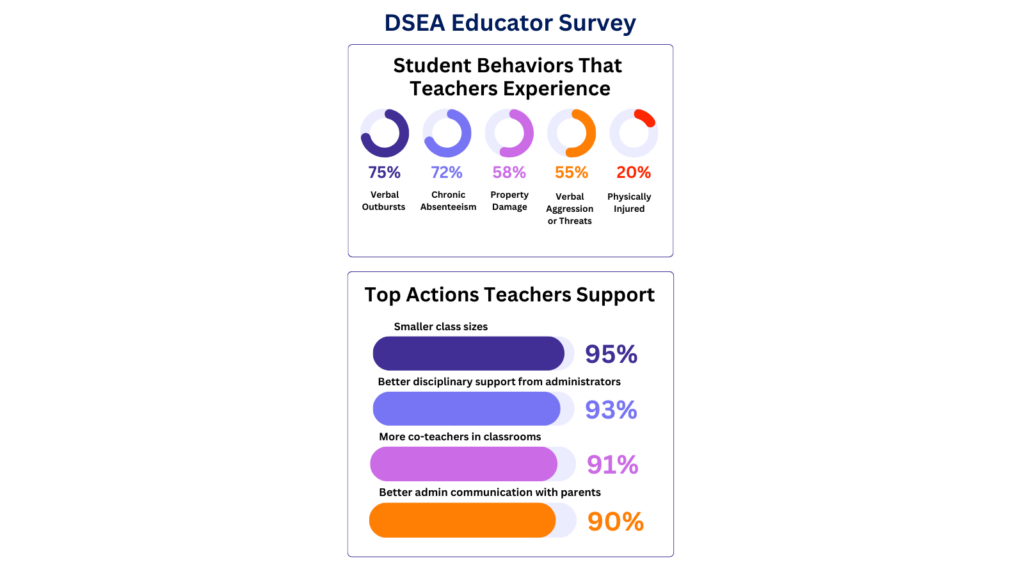
Delaware teacher survey reveals rising concerns with working conditions
A Delaware State Education Association (DSEA) survey conducted July 2024 shows 75% of member teachers were dissatisfied with working conditions compared to 70% in 2023. More than half say they’ve experienced student verbal outbursts, chronic absenteeism, property damage, and verbal threats over the last three years.
More than 75% of educators report a lack of parental support in dealing with student discipline, and 60% say they lack support from school administrators. Sixty-two percent of DSEA members report higher levels of stress/burnout.
Most teachers identified six actions they believe can help address student behavior issues:
- Smaller class sizes
- Better support from administrators
- More co-teachers in classrooms with large numbers of high needs students
- Better administrative communication with parents
- More professionals and paraprofessionals to
- Implement building or district-wide cell phone policies

Student Behavior & School Climate Task Force Issues Draft Report
The 24-member task force of government, educational, resource and school behavioral representatives, is focusing on family engagement, safety on school buses, and improving the statewide multi-tiered systems of support (MTSS) as the core of its final report, which the group must submit to the state by November.

Survey finds most parents dissatisfied with K-12 education
A majority (55%) of parents of K-12 students are dissatisfied with education, essentially the same level as in the past year.
Gallup says, “As has consistently been the case over the past 25 years, parents of school-aged children are much more likely to express satisfaction with the quality of their own child’s education than the U.S. education system overall. …The 70% of parents who are now satisfied with their child’s education is below the 76% trend average since 2001. Parents’ satisfaction has fallen 10 points over the past two years.”
Education Freedom event held September 19

More than 100 people attended the second annual Caesar Rodney Institute and Americans for Prosperity Foundation Education Freedom Event.
A powerful lineup of speakers provided insights into the factors driving the poor performance of Delaware’s public education system.
The assembled experts covered:
- academic performance trends over the past 20 years and how it declined when accountability and rigor were eased
- the lack of direct instruction, implementation of the science of reading, transparency and accountability that has led to declines in Delaware’s education performance
- the importance of family involvement in raising kids
- the high levels of chronic absenteeism of students and teachers
- behavior and discipline concerns in schools
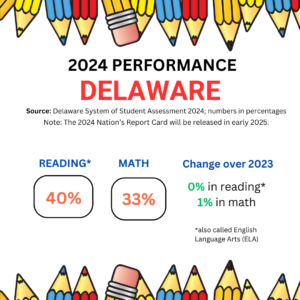
Delaware’s state-wide test scores from the 2023-2024 school year were released August 15.The statewide scores showed virtually no change in student performance: 33% proficiency in math; 40% in reading. In 2019, math was at 44% and reading was 53% in English Language Arts.
Long Term Trends
According to the Caesar Rodney Institute, since 2016 the number of Delaware public school students increased a mere 3.6%, while spending increased a whopping 56.2%! The only decline was in educational outcomes, among the bottom five in the country. The issue is not more money but how it is allocated so money follows the student.
Delaware’s Secretary of Education Mark Holodick said that the stagnant results are concerning but he believes addressing factors such as attendance rates and students’ connections to the school along with providing more mental health professionals will help.
Seaford a success story in latest test scores report
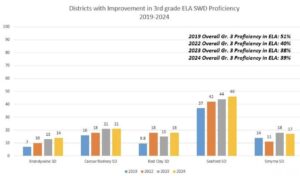
The Delaware Balanced Assessment test scores were stagnant year over year, but one school district defied the trend. Seaford School District showed steady improvement in the past five years in English language arts (commonly known as reading).
In its Department of Education press release, Seaford’s leaders noted these factors for their student success:
- Students have access to high quality Tier 1 instruction with appropriate accommodations.
- Students receive these accommodations all year during instruction to help them meet grade level standards.
- Students are placed with staff they feel comfortable with on testing days.
- Educators constantly review all of a student’s data to determine what the student needs to be successful.

75% of teachers likely to leave education early
A Delaware State Education Association survey sheds light on the sad state of education FOR TEACHERS. Seven in ten of the respondents in the survey said they were highly dissatisfied with working conditions such as chaotic classrooms. Could this be one reason Delaware has hundreds of teacher vacancies across public schools? One can only guess that many teachers aren’t looking forward to the start of a new school year.
(8-5-24)
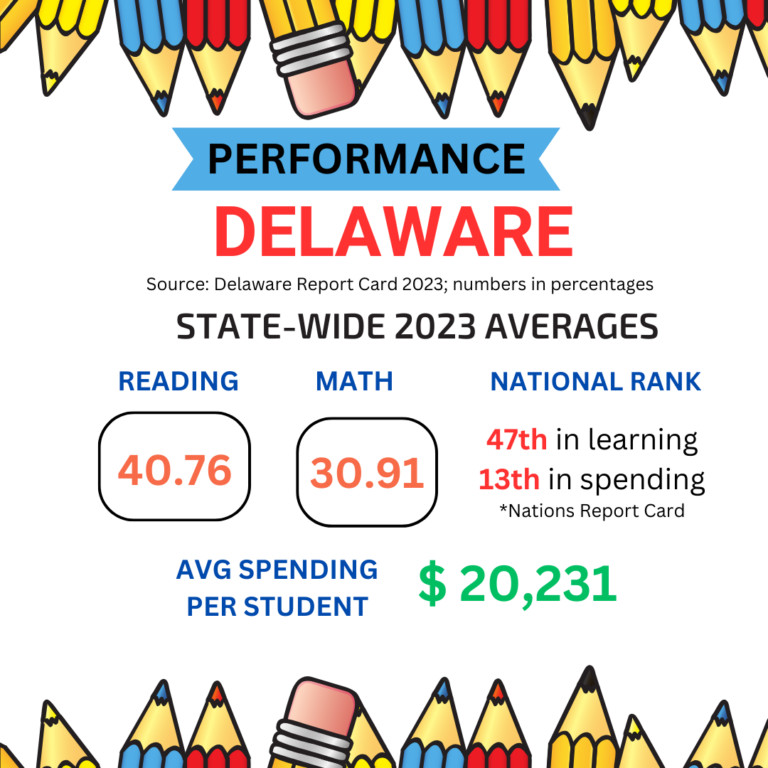
Delaware schools still fall short after 8 years
According to the Caesar Rodney Institute, since 2016 the number of Delaware public school students increased a mere 3.6%, while spending increased a whopping 56.2%!
The only decline was in educational outcomes, among the worst in the country over that time.
The state’s budget for education was increased $1.3 billion despite years of academic underperformance.
State assessment scores are slated to be released on August 15 and Mark Holodick, head of the Delaware DOE, says they will be mostly “stagnant.”

Continued chaos at August Christina School Board meeting
More chaos reigned at the August 13, 2024 Christina School Board meeting, much of it about the board itself and how this dysfunction will affect the district’s planned referendum early next year.
Delaware DOE Mark Holodick and WLC head Laura Burgos also provided updates.
Read two reports about the meeting and ask why we can’t find and elect better school board members who focus on what’s best for students in a district that does not do well in academic achievement.

Christina School District, We Have A Problem
In an amazing public display of dysfunction, the Christina District School Board argued over process, FOIA violations, a controversy about whether a school board member still lived in the district, and the proposed action to suspend the superintendent for reasons unknown. Seven hours later, at nearly 3 a.m., the Board narrowly voted to indefinitely suspend the superintendent.
The state Department of Justice placed the School Board on review for a year because of what they say are various violations of state law.

Milford school board tables measure to limit 'controversial' subjects in school
A controversy is brewing over a proposed policy revision that would prohibit content, items or conduct that could create a hostile environment.
With opposition from some teachers, students and families as well as the ACLU for being overly vague and broad, the board deferred a vote on Policy 6103 until more discussion occurs at its July 15 school board meeting.
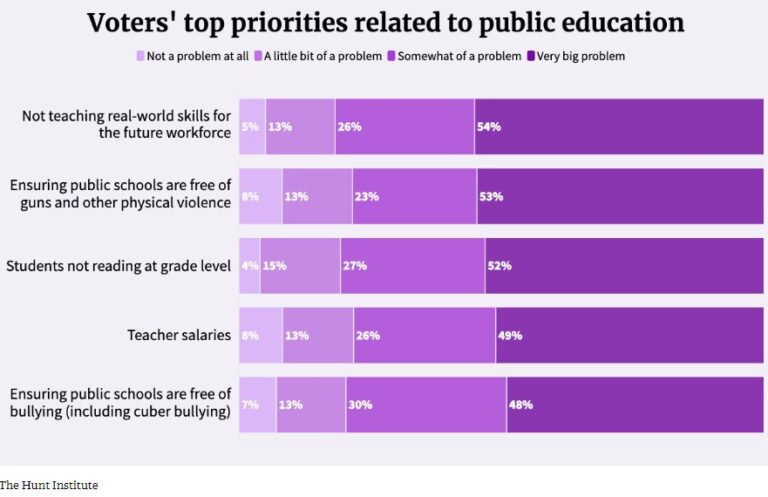
New study reveals voters top 3 priorities for education
The latest survey from The Hunt Institute show that voters want education leaders to prioritize their budgets on school safety and student literacy. Access to high-quality instruction focused on providing real-life skills was a third priority (such as financial literacy).
These are issues Citizens for Delaware Schools also identified as priorities. It is our belief that schools and School Boards need to focus on these.
How much mental health support should every child receive?

This was the crux of the discussion at the June 20 House Task Force on Student Behavior and School Climate. The state Department of Education presented a complex model for mental health supports (MTSS) with little data that shows this “Whole Child” model will work. They propose funding (yet more) to provide all 142,000 students with at minimum the “Tier 1” services.
Rep. Eric Buxton presented some thoughtful points that need more discussion to be more confident about this approach, including the need to simplify it.
WalletHub "best school systems" rankings not what it seems
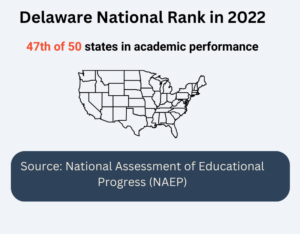
Recently, some people are citing misleading information that Delaware ranks ninth as “States with the Best School Systems.” WalletHub, a credit-monitoring site, ranked every state’s public schools for “Quality” and “Safety” using 32 metrics with different weightings. In short, it’s complicated.
WalletHub’s analysis factors in these other measures such as performance, safety, class size, funding, and instructor credentials, which waters down the effect of academics. Based on these metrics, the states with the best school systems, in order, are Massachusetts, Connecticut, New Jersey, Virginia, Vermont, New Hampshire, Minnesota, Wisconsin, Delaware, and Maryland.
- Delaware
“Delaware schools rank 15th overall for quality and second for safety. Delaware has the second-lowest bullying incident rate and has an above-average ACT score of 24.1. Delaware does fall behind in pupil-to-teacher ratio, which is 22:1, above the national average.”
This approach contrasts with the focus on academic scoring as the best, most reliable way to measure progress. It’s how Kids Count, NAEP, Citizens for Delaware Schools and others evaluate not schools but students.
Financial literacy bill fails to get out of committee

The Education Committee decided that another study needs to be done first.
The American Public Education Foundation notes that Americans are facing personal economic catastrophes if they don’t learn how to properly manage their finances. The sooner young adults are educated in this practical life skill, the greater chance they will avoid the misery of oppressive debt (think student loans), abusing credit cards, and insufficient savings to cover a job loss, retirement or even buying a house.
READ THE APEF Nation’s Report Card about financial literacy in schools and their rating for Delaware. A thoughtful commentary in Delaware Online explains the need for financial literacy classes for Delaware students.
Efforts stalled in the Delaware House for HB 203, which would prepare high school students to be financially adept when they go out on their own .
A 2015 study was already conducted, recommendations laid out in 2018 and a free curriculum NextGen Personal Finance is available.
Why is this effort not moving forward faster after all these years?

How public schools become ideological boot camps
In nearly every public school in the country, children are given curriculum materials that have no official oversight or approval.
So what's going on?
The Free Press, June 12, 2024
Despite all the curriculum mandates that come from the state and federal levels, teachers still exercise significant authority in what and how they teach.
One step that can help: legislation specifically requiring teachers to post all lesson plans and materials online on a daily basis, including material they create or find on the internet.
Robert Pondiscio of the American Enterprise Institute explains.

Earlier focus on "Science of Reading" in Delaware needed
Two years ago Delaware State lawmakers passed the “Science of Reading” law in an effort to improve Delaware’s literacy rates. It was a step in the right direction.
Dr. Tanya Hettler of the Caesar Rodney Institute just released her analysis of the shortcomings of the new law and what more must be done to ensure that teachers learn how to teach reading based on the science of reading to all students in their classes from day one.
Five actions to speed the Science of Reading implementation
The National Council on Teacher Quality issued a report this spring that outlined ways to improve and sustain teacher effectiveness in the science of reading. Their assessment of Delaware is that the state addresses all five policy components but none in detail.

NewTitle IX rules go into effect for some states
School districts in Delaware (which is not challenging the changed regulations) will need to adhere to the new regulations if they want to continue to receive federal Title IX funds. Milford’s school district has taken this step while explaining to some upset parents whey they were doing so.
READ MORE from Milford LIVE
Federal judges block Title IX expansion for several states; say it hurts women's rights
FRANKFORT, Ky. (AP) June 17— A federal judge temporarily blocked the Biden administration’s new Title IX rule expanding protections for LGBTQ+ students in six additional states. U.S. District Judge Danny C. Reeves referred to the regulation as “arbitrary in the truest sense of the word” in granting a preliminary injunction blocking it in Kentucky, Indiana, Ohio, Tennessee, Virginia and West Virginia. His ruling comes days after a different federal judge temporarily blocked the new rule from taking effect in Idaho, Louisiana, Mississippi and Montana.
The ruling Monday in Kentucky was applauded by the state’s GOP attorney general, Russell Coleman, who said the regulation would undermine equal opportunities for women. “The judge’s order makes clear that the U.S. Department of Education’s attempt to redefine ‘sex’ to include ‘gender identity’ is unlawful and beyond the agency’s regulatory authority,” Coleman said in a statement.
The new rules are set to go into effect in August.

Capital schools moved to remote learning in the last days of school
DelawareLIVE reports that some schools in the Capital School District held several school days virtually in the days leading up to summer break.
The core issue, according to emails and calls sent to parents from the schools, is a shortage of transportation and teaching staff. Like most workers, teachers and other staff have sick days and vacation days they can take rightfully as part of their state benefits package.
Last year, Celeste Bunting, a human resources director for the largest school district in Sussex County, told a House Education Committee that about 300 of its 1,000 educators are off on any given school day.
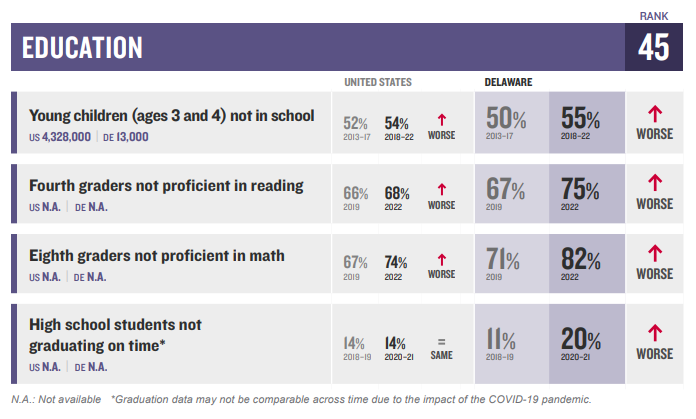
JUST RELEASED: Kids Count data on education trends; Delaware ranks 45th
The Annie E. Casey Foundation ranked Delaware 45th in academic achievement in its latest report (June 2024). They open their section about education with the following commentary:
“The 35th edition of the Annie E. Casey Foundation’s KIDS COUNT® Data Book examines the unprecedented declines in student math and reading proficiency. Eighth-grade math achievement worsened across all racial and ethnic groups between 2019 and 2022. The largest percentage point drops in proficiency were seen among white and multiracial students.
Today’s students, who will comprise America’s future workforce, are ill-prepared for the high-level reading, math and problem-solving skills required in a competitive global economy. The failure to adequately prepare our children will have dire consequences for their futures and for the economic vitality of our nation.”
ACCESS THE 2024 KIDS COUNT DATA BOOK
Here’s how Delaware LIVE covered the report:

Out-of-school suspensions top 37,000 over past 3 years
The House task force on school climate received a briefing In early June of student behavior trends over the past 3 years.
2023 behavior infractions increased in elementary schools and declined in middle and high schools overall. Nearly half of the incidents resulted in out-of-school suspensions. PolyTech’s accountability program of bringing in experts and parents for handling a classroom disruptor was cited as an example of an approach that works.
Notably, middle school incidents are increasing the fastest in certain categories, including inappropriate touching with a student victim.
Incidents involving the possession of marijuana, tobacco and vape products are increasing substantially for middle and high schools from minimal occurrences in 2021.
Fighting reports spiked right after the pandemic, but they were declining by 2023.
READ THE DELAWARE LIVE ARTICLE
The committee’s next meeting is Monday, June 24 at 4 p.m. Watch it here.

Christina School District next up for referendum request?
The parade of school referendums will be continuing into next year. Christina School District is the latest to announce its intentions to ask taxpayers and the state for more money. Current total request is expected to be between $285 million – $350million
The district – the second largest in the state with more than 13,000 students – is expected to ask the state for more than $150 million to help complete capital projects. The board will submit a certificate of necessity to the state Department of Education by August 31, its board announced in its monthly meeting Tuesday (June 4, 2024) night. The capital request is broken out by school levels:
$60 million – $75 million focused on expanding early education along Route 40, supporting special education programming and maximizing efficiencies and resources.
$150 million – $200 million for a new middle school and athletic fields.
$75 million – $90 million for high school building improvements.
There also may be a separate operating request. The projected referendum date if pursued would be February 2025.
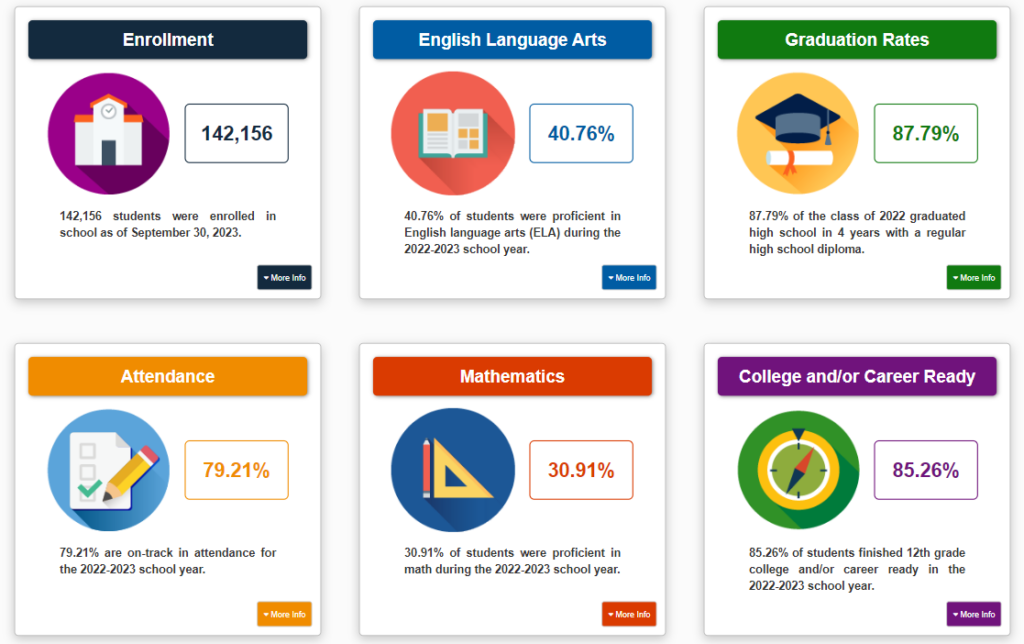
State graduation rate much higher than student reading and math proficiency scores
The state graduation rate of 88% in 2022-23 was double the rate student proficiency rates of reading (41%) and math (31%). Moreover, the Delaware Code does not require proficiency on standardized tests as a requirement for graduation.
What explains this contradiction? A Delaware Live article asks individuals from several advocacy organizations to explain the factors that may be at play. The article also lists the performance numbers for each of Delaware’s school districts so you can compare and contrast your school district with others.
Best performing school overall:
Charter of Wilmington
Graduation rate: 99%
ELA (English): 93.4%
Math: 87.1%

Smyrna School District referendum approved by 22 votes
After failing on the first try, Smyrna School District went back to voters with a more modest request that removed operating funds and focused on funding a new middle school.
Voters narrowly approved the request on June 6, 2024.
School officials indicated they will consider pursuing another referendum next year after the court-ordered property tax reassessment results for homeowners is known.

Ohio bill 250 on school cell phone use set to become law
School leaders say limitations in districts that have restricted use are seeing better grades and fewer disciplinary issues. Best of all, this policy doesn’t cost a dime more to implement.
WLWT5-TV in Cincinnati provides more detail about the bill’s requirements, which passed the state legislature unanimously.

Evidence mounts for cell phone bans in schools
The Fordham Institute has followed this issue closely and Daniel Buck summarizes all the research that conclude that students greatly benefit by removing cellphones from the classroom. In the Red Clay School District, teachers and individual schools determine how to handle cell phones in their classrooms. Colonial School District has students place their phones in a phone holder at the beginning of their school day.

School Board elections results are in
Right on cue, most Delaware voters stayed home, deciding school board elections aren’t important. In Red Clay, 2,043 people voted for more spending and DEI. Compare that number to the nearly 10,000 who earlier approved a tax increase (in the referendum) to reward failing schools with more money.
Here are recaps of the statewide school board election results.
Appoquinimink school board candidates face off in forum
In one of the most hotly contested elections, three of the four candidates participated in the forum. They had some interesting things to say.
Christina school board candidate talks testing, guns, LGBTQ and more
Amy Trauth is running for a spot on the Christina school board. She answers questions in a recent First State Educate forum.
WGMD features podcasts with Sussex area school board candidates
Host Mike Bradley has conducted 20-minute or so interviews with many of the candidates in Sussex County. To see a list and hear the candidates interviewed, CLICK HERE.

Yet another task force wants more money for schools
This time the Student Behavior and School Climate Task Force says it needs more money for more specialists to treat more misbehaving children
Is there any end to the groups in Delaware asking for more money to add more government (public school) employees to solve problems that could be solved with inexpensive, common sense solutions? Do we need yet more government employees to solve every problem? What about all the money going to mental health supports, reading specialists, and now ‘misbehaving children? What if schools could get parents and educators on the same page to provide more effective accountability action to reduce bad behavior?
Two Delaware media outlets covered this meeting so you can learn more.

Gallup Poll finds that good grades can sideline parents
B’s on a report card aren’t the full story, but parents may not realize it, according to a Gallup/Learning Heroes survey Nov. 2023.
What’s the problem? Seventy-nine percent of parents report their child receives traditionally good grades — mostly B’s or better. The proportion receiving B grades or better (as reported by parents) is greater for White children (80%), compared with Black (73%) and Hispanic (75%) children, and it is also greater for children in the highest versus lowest income households (88% vs. 69%, respectively).
Federal data released in February showed that at the beginning of the 2022-23 school year, public schools reported on average half of their students were below grade level.
What can you do? Test your children yourself. Make it a game. Take turns reading from a book. Find a math game or puzzle to play together.
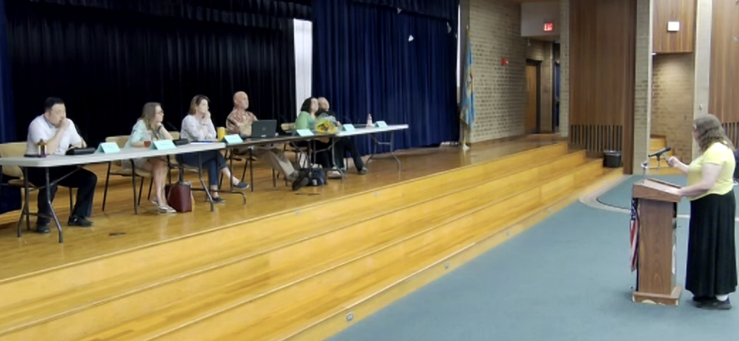
Christina SD community town hall: phones, bullying, dress code, SATs
In a laudable attempt to open up communications with the community, the Christina School Board held its second town hall this school year on April 30. It offered an opportunity for residents to interact directly with the board, something that does not happen during school board meetings.
The Delaware LIVE article noted that the town hall was sparsely attended.
Schools try ways to limit cellphones to keep students focused
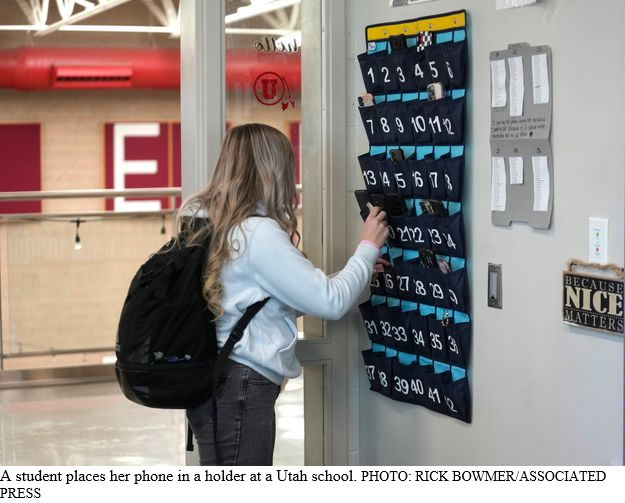
Educators cite classroom distractions and states aim to limit use, as the U.S. warns of mental health risks. The Wall Street Journal looks at the challenges and possible solutions to this uniquely 21st century problem that gets in the way of classroom learning.
NOTE: In Delaware, the Colonial School District uses the Yondr Pouch in its schools.
READ THE WALL STREET JOURNAL ARTICLE (5-min read)
What would Abe Lincoln think of our education system?

This commentary first appeared as a blog in A Better Delaware. It discusses why school board elections and community engagement with local schools is important and deserving of more voter attention than it receives.
READ THE COMMENTARY (3-min read)
Reason Foundation shares new study on public education

Reason Foundation’s latest report “Public Education at a Crossroads” analyzed almost 20 years of data to uncover five key trends as it relates to school funding, spending, staffing and outcomes. Their findings offer interesting insights for policymakers. It’s worth checking out, especially the data about Delaware schools.
- Education funding is up in nearly every state.
- Teacher salary growth lagged funding growth in all 50 states.
- Public school staffing growth is far outpacing student enrollment growth.
- Education dollars are increasingly going toward spending on employee benefits.
- There isn’t a consistent relationship between funding growth and outcomes across states.
REASON FOUNDATION REPORT (long read)
New strategies needed to improve schools say two state representatives
Delaware’s public education system is in dire need of reform and new approaches. State Senator Brian Pettyjohn and Representative Lyndon Yearick lay out their thoughts about solutions in this commentary which appeared in the April 9 edition of the Cape Gazette.
READ MORE (5-min read)
Cape Henlopen referendum suffers defeat; new vote in May fails a second time
Voters rejected twice the district’s justification to raise residents’ taxes. In Cape Henlopen, the Cape Gazette opined that including a $36 million natatorium in the request for more essential funding may have doomed the vote. However, when Cape Henlopen tried again with a revised request without the natatorium in it on May 21, 2024, nearly 53% voted no and the referendum failed. This means the money is returned to the state to be deployed elsewhere.
Wilmington Learning Collaborative has uphill battle
The resignation from the committee of the Christina School District Superintendent and another extension are more examples of the complex mess known as the Wilmington city schools.
The need for school referendums explained

Jarek Rutz of DelawareLive takes a deeper dive into the factors driving the need for six of the largest school districts to hold tax increase referendums this year.
LEARN MORE (3-min read)
Dozens of states require financial literacy classes; will Delaware follow suit?

Personal finance classes have become a requirement for high school graduation in dozens of states in the past few years, sparking hope for activists that financial literacy is finally receiving the support it deserves.
In this Delaware Online opinion piece, the authors explain why it’s so important that Delaware get on board with this movement.
READ MORE (3-min read)
A DelawareLive in-depth report on education funding

Funding education takes up one-third of the state’s total budget, and ask yourselves the question: are our children and taxpayers getting their money’s worth? Not so much judging by the results of their test scores. This piece looks at where much of the $2 billion in the Governor’s budget is going and how much goes to learning the basics of reading, writing and arithmetic.
READ THE ARTICLE (5-min read)
Colonial SD town hall answers citizens' concerns

DelawareLive reported on a virtual town hall held by the Colonial School District. The major concerns had to do with the proposed $50 million sports complex and tax increases. Scroll down the January 10, 2024 DelawareLive item about the tax assessment impacts to read this section:
When asked about the tax impact of both the referendum and property reassessments, the Colonial chief finance director Emily Falcon said that if the property values quadruple, the school tax rate would be cut by a fourth, since the district by law must remain revenue neutral.
“We can’t get any more money after reassessment than we’re getting right now,” Falcon said, “Unless the school board chooses to take that little bit extra that they’re allowed to under Delaware law.”
That “little bit extra” is up to a 10% increase in the district’s local revenue. So if the revenue is $50 million, the maximum revenue increase would be an extra $5 million, which would be reflected in the tax rate and spread out among district residents.
Yard signs inform residents of education issues

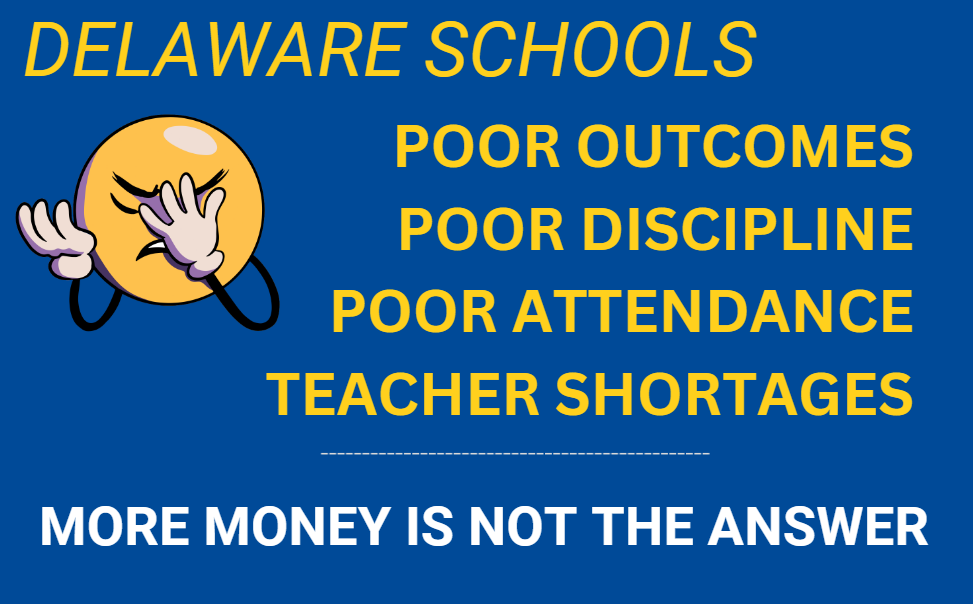
These signs will appear around the state from time to time to draw attention to the issues driving Delaware’s poor performance in public schools. The purpose is to get more residents to care about what’s happening in our schools, and to:
- Become better informed about how much money (6th highest in the nation) we spend per student on average($20,231 in 2023),
- Learn about solutions that could improve student outcomes
- Insist on results: that school leaders finally start showing upward movement on test scores to match the money they receive from us.
Citizens for Delaware Schools announces its first sponsorship

The organizers explain the compelling reasons Citizens for Delaware Schools wanted to support this worthy effort.
“Spelling bees help promote literacy by providing children with a positive goal to work toward and gives them a forum to display the fruits of
their hard work.
The bees also aid children in learning, improving comprehension and developing study skills. The benefits of spelling bees extend beyond language. Since children are required to spell words while on stage, kids also develop self-confidence, communication and public speaking skills, and the ability to thrive under pressure.”
Cape Henlopen School District referendum set for March 26

On January 27, 2024, the Cape Henlopen School Board approved Superintendent Robert Fulton’s recommendation to ask voters to approve a 2-part referendum covering operating costs and capital expenses to address the continuing growth of students in the district.
Breakdown of Costs
The $77.6 million capital expense portion will go for a new district office, the purchase of land to build new schools, a bus maintenance facility, and a natatorium (swimming facility). The $6 million operating cost part will cover items such as staff salaries, school safety measures, and increased energy costs.
You can WATCH the January 27 School Board meeting about the referendum, starting at 40 minutes 20 seconds into the meeting.
Community meetings will be held to help voters learn more about the need, how the money will be spent and the impact on property owners’ taxes. See the EVENTS page for times and location.
Survey says most underestimate public school spending

Education Choice released the results of its 11th Annual Schooling in America survey that looked at the perceptions of Americans about education. The survey was conducted in the spring of 2023. Let’s first look at one of those: spending
Most Americans and parents drastically underestimate public school spending until given the facts.
The median parent respondent guessed that spending per student is $5,000 annually. The actual lowest state average per student was $9,104 in 2021.
For comparison, Delaware’s average spend per student in 2022 was $18,604.
Facts Change Perceptions
While 75% of respondents underestimated the cost, 81% of school parents did.
The research then tested how the percentage changes when a publicly reported funding statistic was placed in front of them. No surprise that fewer Americans (43%) think funding is too low vs 58% of those who don’t have such information.
Smyrna School District sets March 9 for its referendum

The Smyrna School District is seeking voter approval for a referendum to fund operating and capital project spending they say is needed.
The capital request of $37 million for school expansions and a new intermediate school reflects the additional costs as a result of inflation.
The operating funding would go to salaries, mental health supports, technology, constables, and extracurricular activities for the middle school.
Voters are urged to attend one of the public meetings to determine their support prior to voting.
See our EVENTS page for listed times and locations. The District website has more details.
Voters voice concerns about Appoquinimink referendum

(2 minute read)
The community showed up to an Appoquinimink School District town hall January 22 and expressed their belief students should be able to do well with schools staying within their budget.
They pointed out that some of the requests have to do with what they perceive as unnecessary spending on top-of-the-line buildings when more money should be directed to teachers’ pay.
Read this short WDEL article with citizens expressing their views.
Education's newest "R": Reversal in learning

(10 minute read)
A Jan. 23, 2024 RealClearInvestigation article pulls many threads together in an understandable explanation for the dire state of education. The author Vince Bielski uses studies to back up his claims. Some highlights:
- Money without accountability will not solve our education crisis. Students had learning loss despite federal COVID spending of an average 6% increase per school for four years. Now that extra funding is ending.
- As learning declined, so did academic standards. More than 40 states eased requirements in 2020. (Source: Report in Education Week)
- Parents haven’t been much help. Either
- Most don’t know about the dive in test scores or don’t care.
- Today’s inflated grades may give them an impression that their kids are doing better than they are.
- High-dosage tutoring works if it is integrated into the school day and occurs at least three times a week.
Milford School Board gets update on student literacy and discipline

Editor’s Note: Milford School District is addressing many issues that Citizens for Delaware Schools defines as key to get education back on track. Here are two short stories that demonstrate progress driven by an effective School Board.
Literacy plan
Officials in the Milford School District answered questions and gave updates Jan. 22 about the progress of the district’s literacy plan.
READ MORE (3 minute read)
Plan to Address Discipline Issues
Here is a recent story from Delaware Live that looks in-depth at discipline issues and the steps to address them at several schools.
READ MORE (5 minute read)
CRI: Money is not the problem with schools

Recently the Delaware Department of Education (DDOE) released a $700,000 Education Funding Study that recommended Delaware increase its education spending by $600 million to $1 billion more to improve education in Delaware. Such a staggering amount would require legislation to enact.
Delaware already ranks near the top in spending on education while near the bottom in academic performance. So, is more money the answer? Or can some other action be tried first?
The Caesar Rodney Institute took a closer look.
How ideology slips into the teaching of math

If you’ve ever wondered how ideology is used in math, Max Eden of the American Enterprise Institute examines how California’s recently adopted, highly controversial math framework weaves ideological assertions into curriculum as “evidence-based” best practices. He reveals how there is no evidence that such an approach increases math proficiency.
Note how the students react to the math word problem example.
READ Trauma-Based Math Pedagogy (Real Clear Education)
*Pedagogy is a term that refers to the method of how teachers teach, in theory and in practice.
Removing cellphones from classrooms improves learning

We’ve seen videos of kids going berserk when their cell phones are taken from them. The U.K., France and China already implemented student bans on cell phones. Will the U.S. be next?
Two articles from the Fordham Institute take a comprehensive look at why removal of cell phones in class is a good idea, the challenges in implementing such a policy and finally, solutions.
READ: Should schools ban cellphones? by Tim Daly
What might a ban policy look like?
Research shows how addictive cellphones have become and that many high tech executives limit their children’s use of them. Daniel Buck, a former educator, discusses ways to bring this same common-sense approach in the interest of improving student learning.
Red Clay school district referendum session
MONDAY, DECEMBER 18, 5pm
This Monday, December 18, at 5 pm,
James Spadola will host a Zoom conversation with Red Clay Superintendent Dr. Dorrell Green to discuss and learn more about the Red Clay School District referendum.
On February 28, residents of Red Clay will vote on a Tax Increase Referendum. Join this conversation to hear the viewpoint of the Red Clay Superintendent.
Update on Brandywine School District referendum
2/14/24 – Voters overwhelmingly approve Brandywine SD referendum
Details about Brandywine School District’s February 13, 2024 referendum was discussed at the School Board meeting on Monday, December 18 at 7 p.m. It’s a chance to get details about how their tax dollars will be spent if the referendum is approved.
Click here to watch the meeting or to view later.
The average homeowner would see a $181.75 increase in taxes in the first year, and then $145.40 increase thereafter.
The Brandywine School District website has complete details and a taxpayer calculator.
Appo voters reject school referendum
Voters in the Appoquinimink School District narrowly rejected all three parts of a referendum in a Dec. 12 special election. The district was asking for $82.9 million to pay for three new schools (capital funds), increased staff pay (operational funding) and the building of a larger bus lot (extension of capital funds).
Appoquinimink’s nearly 2,000 teachers are the lowest paid of the traditional public school districts in New Castle County, according to a WDEL.com story.
It’s the first failed referendum in Appoquinimink since 2013, after successful campaigns in 2019 and 2016. Delaware allows districts to come back one additional time for capital requests, before the state moves its funds to meet another district’s request. The board will try again on April 23, 2024.
School referendums coming up for votes

Appoquinmink, Brandywine, Colonial and Red Clay School Districts are moving ahead with special elections on referendums in the next 3 months to help fund their schools’ operating and capital expenses/needs. Each district will be communicating about the needs and impact to taxpayers.
Appoquinimink School District is the first up, with their special election fast approaching on December 12. They are seeking a total of $82.9 million across three separate votes to cover operating costs such as teacher salaries plus capital expenses to build three new schools and a larger bus lot. On average, property taxes would increase by $435 annually if approved. The School District has more information on its website. READ MORE
How funding requests work
Referendums are funded two ways:
1. The state generally approves and then pays 60% for the requested projects.
2. The rest (generally 40%) must be funded locally, which means through increased property taxes. Voters must approve this funding before districts can get the state money.
Three school districts' referendums slated for February

Brandywine, Red Clay and Colonial School Districts will ask voters to approve their school referendums in February 2024.
Brandywine School District’s election is February 13. No other information is available currently other than the funds will be used for operating expenses. On average, property taxes would increase by $180 in the first year, slightly less in the second. READ MORE
Red Clay School District will hold a special election for their $265 million funding request on February 28, 2024 for capital projects. The average homeowner will see taxes raised about $404 over three years. The district’s last referendum occurred in 2015.
Colonial School District puts their referendum to a vote on February 29, 2024. They will seek $48.8 million for capital and operating costs. With the average Colonial household assessed value set at $62,547, the average district homeowner will see an annual increase of $250.19 in taxes.
One thing to keep in mind: upcoming notices of property reassessments
According to Delaware Online, the plan is to mail new property assessments to New Castle County property owners starting in November 2024, based on these adjusted values to calculate new tax bills starting with 2025. This means homeowners may face two property tax increases in 2025.
CLARIFICATION: Several school district officials stress that the referendum tax impact will be “revenue neutral”, meaning that by law adjustments will be made so only one increase will occur.
Reproductive Health Services approved for McCullough Middle School

At its November meeting, the Colonial School Board approved the use of reproductive health services such as birth control and sexually transmitted disease testing at the McCullough Middle School. McCullough parents must initially opt-in by signing a consent form. After that, parents will not be informed of their child’s care unless the student tells them, or they get a bill from their insurance company. If parents don’t consent, their children will still receive the other health services provided.
A parent who asks the school-based health center if their child was treated there will not be able to receive such information due to privacy laws of the school and the health care provider (in this case Nemours).
One Board member noted that McCullough’s students are 82% minority, 42% low income, and 20% with a disability – and therefore at higher risk for pregnancies or sexual predation. Delaware teenage pregnancies are 3.5%, ranking 25th in the nation.
Go to section 8E in the School Board Agenda to review the enrollment form.
Two Title 1 schools named Distinguished Schools

Smyrna Elementary and West Seaford Elementary received national recognition as examples of superior federally funded Title 1 school programs. The honor is given by the National ESEA.
Smyrna earned its recognition as a 2023 Distinguished School for Closing the Achievement Gap between student groups and progress on standardized achievement tests.
West Seaford gained recognition as a Distinguished School for Excellence in Serving Special Populations and progress towards English Language proficiency among multilingual learners during the 2022-23 school year.
(Source: Delaware.gov, Nov. 1, 2023)
Now available: Videos from CRI event

Those who were unable to attend the September Education Freedom forum are now able to view the presentations on the Citizens For Delaware Schools You Tube Channel.
Each video contains information and insights that will help you understand the challenges to and possible solutions for improving public education.
Segments touch on academic achievement, school discipline and safety, student and teacher absenteeism, parental involvement and new models for the delivery of education to meet the individual needs of each student.
New education freedom model urged

At the September Caesar Rodney Institute Education Freedom forum, Rachelle Engen, senior policy analyst on Foundational Education for AFP, outlined a new model for education that fits better with today’s information age.
She started off making the point that education is an outdated system that was created in the industrial age when ‘one size fits all’ was meant for factory workers.
So what’s the answer? A customized model that enables parents to meet their child’s specific needs. It involves:
- Allow the money to follow the child
- Open enrollment to go to the school you think best for your child (Delaware does offer this)
- Education your way – allow students to select a combination of school settings
WATCH (14 minutes)
The plan to improve learning in city schools revealed

The Wilmington Learning Collaboration plans to spend $16.6million through June 2024 to improve learning in city schools. The collaborative’s goal is to improve academic and societal achievement for students at nine city of Wilmington elementary schools across the Brandywine, Christina and Red Clay school districts.
Education Freedom event draws a crowd

More than 80 people attended an inaugural Education Freedom meeting on September 28, 2023 to give families an opportunity to hear from experts about the issues holding back educational progress and possible actions people can take to help improve student outcomes. The Caesar Rodney Institute and Americans for Prosperity Foundation sponsored the event.
Milford parents voice concern about school safety, bullying

At the November 2023 Milford School Board meeting, concerned parents spoke out about the continued level of violence and bullying their children encounter at elementary schools, high schools and on the school buses. There’s even a ‘fight club’ at one school.
Thurgood Marshall Elementary stands out for this reason

As one of three National Blue Ribbon Schools for 2023, Marshall Elementary school’s application summarized its success this way: “The instructors at Marshall Elementary are deeply committed to facilitating students’ academic accomplishments, firmly believing in the potential of excellence in every learner, irrespective of background or ability.”
The astounding fact about this accomplishment?
Most Marshall Elementary students are minorities, yet the school spends only $13,000 per student (compared to the statewide average of $17,000 per student) and performs well above the average on test scores.
Last year’s honorees from Delaware
The three schools that won the award last year were Cab Calloway School of the Arts and Linden Hill Elementary, both in Red Clay Consolidated School District, and North Dover Elementary in Colonial School School District.
Three Delaware schools named Blue Ribbon schools

Closing achievement gaps is possible. Three schools in Delaware were among the 353 across America that were named National Blue Ribbon Schools for 2023. The recognition is based on overall performance and achievement in closing gaps among diverse student groups. The three schools are:
- Olive B. Loss Elementary School, Appoquinimink School District
- Thurgood Marshall Elementary School, Christina School District
- Lord Baltimore Elementary School, Indian River School District
All three schools enroll close to 600 students each. Here’s how each of them compared to Delaware’s state schools for the 2022-23 school year:
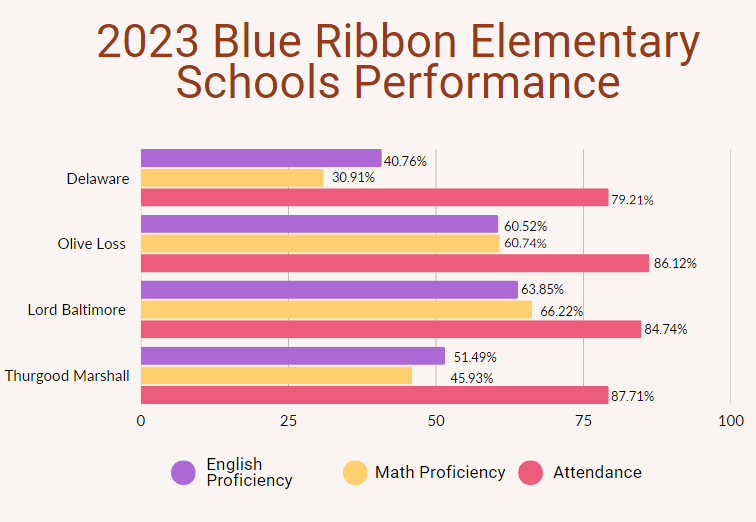
States are raising reading scores of third-graders. Here's how

An old-fashioned solution with a twist appears to be working
The Wall Street Journal reports that at least 16 states are requiring struggling students to repeat third grade to improve their literacy. Parents and school board members in some of these states were hesitant at first.
Holding kids back didn’t turn out to be as bad as feared. For one thing, these so-called retention laws offer extra tutoring, summer school and teacher training to get poor performing students up to standards before the new school year. The programs also exercise flexibility, especially for special education students or English language learners. The result: very few students are held back.
In Nashville, Tennessee, roughly 70% of third graders tested below proficient in reading. All but 1.4% of them ultimately advanced to the next grade. In other states – Michigan for one – outcry was so fierce that the governor there rescinded the law.
Teacher absenteeism calls for staff flexibility, strategies

A human resources director for the largest school district in Sussex County shocked a House Education Committee hearing in April when she told them about 300 of its 1,000 educators are off on any given school day.
Dr. Bunting spoke at a town hall last May sponsored by the Citizens for Delaware Schools about the challenges of reducing teacher shortages.
About 800 of those educators are teachers, and their absenteeism rains down problems for the district, said Celeste Bunting, director of human resources at Indian River School District.
For a look at the situation for other school districts, read more in this July 11 article at Delaware Live.
Milford School Board removes restorative practices section

The Milford School District’s Board voted to remove the section about restorative practices from the student code of conduct. Although restorative practices have been flushed from the code, School Board Member Matt Bucher said that the board in no way is condemning the use of restorative practices.
Rather, he said, the requirements of that section weren’t clear enough in the code, which made it difficult for teachers to consistently use and caused confusion for the community. He added that teachers may use the techniques voluntarily as a classroom management tool.
For more, read this August 1, 2023 Delaware Live story.
Civics, history scores for 8th graders slump to lowest scores ever

Teaching students to understand aspects of American history and government such as the rule of law, trial by jury and civil rights is important to the health of our representative republic (also called democracy).
According to the data released by the U.S. Department of Education, 31% of eighth-graders performed below basic level in civics in 2022. Those students were unable to correctly answer questions asking them to identify basics such as common characteristics shared by all constitutional governments.
National Center for Education Statistics Commissioner Dr. Peggy Carr said, “These data are a national concern. The health of our democracy depends on informed and engaged citizens.”
Other findings include:
- 49% of 8th graders report taking a civics class.
- 29% of teachers primarily teach civics
- Higher performing students see themselves able to make a difference in their community.
These results may explain why only 18% of those aged 18-34 say they are proud of their country, a record year (Source: Gallup Poll). Note how this percentage corresponds to the percentage of 14-year-olds who passed a civics test. This is why civics education matters.
Delaware state legislature introduces 31 education bills

The Delaware Legislative session ended June 30. Here are several bills on education your state legislators introduced. Bills not passed into law this year will roll over to the start of the second half of the 152nd session in January 2024.
This Delaware Live article does a nice job summarizing other education-related bills.
HB 230 will make Delaware a sanctuary state for medical experimentation on children confused about their gender
This bill would allow minors in states where such surgeries are illegal to receive care in our state. It also allows Delaware to take custody of children in certain circumstances and order irreversible ‘sex-change’ surgery. It gives medical professionals immunity from lawsuits resulting from botched surgeries or lack of informed consent. See more at the Delaware Family Policy Council website.
HB 3, 4, 5, 6, 200 is a package of bills to provide mental health services to students
HB 3: Students with more than two excused absences for mental health will be referred to a behavioral specialist and report entered into a state database. Passed.
HB 4: Schools get more behavioral health support in aftermath of a school-connected event such as death of a student or school employee. Passed.
HB 200: Establishes a mental health services unit for Delaware high schools. In the Appropriations Committee. Read the bill
Educators tout what they consider legislation highlights in this TownSquare Live article. It’s worth a read.
DISCLAIMER: Content is intended for informational and convenience purposes. We make no claims to accuracy when editing for space. Go here to read the actual bills. Third-party sites are responsible for their content.
Red Clay English teacher resigns for these reasons

Amy Norton, an English high school teacher for seven years, spoke at the June 21 Red Clay School Board meeting. She explained she was leaving the district because she believes student learning should be enriched by reading literature and that’s not happening.
Freshmen in her classes read only one piece of literature: Shakespeare’s Romeo & Juliet. Sophomores didn’t read one poem or novel.
She said she was told that the district wants 70% of school reading to be non-fiction.
“I was told that science and social studies teachers are not trained and can’t be relied upon to teach our students to comprehend the non-fiction texts that they use within their classrooms.”
She said she believes “literacy is an interdisciplinary skill all teachers can teach.”
Reading literary fiction is important. Here’s why.
It helps kids gain empathy.
Literary fiction aims to resemble real life. Some literary fiction examples include To Kill a Mockingbird by Harper Lee, The Grapes of Wrath by John Steinbeck, and A Tale of Two Cities by Charles Dickens.
While reading non-fiction is fine for building knowledge about a subject, neuroscience research suggests that reading literary fiction helps students develop compassion and the critical thinking side of their brain.
Good literature presents characters with competing and often equally valid viewpoints. The insight gained from this reading experience gives one an expanded ability to understand and respond to multiple competing viewpoints.
University of Toronto researchers discovered in their study that individuals who read short stories tend to be more thoughtful, creative, and comfortable with competing narratives.
At the Princeton Social Neuroscience Lab, psychologist Diana Tamir demonstrated (using brain scans) that people who often read fiction are more skilled at working out what other people are thinking and feeling.
One-fourth 14-year-olds passed the NAEP civics test

Only 20% of 8th graders nationally passed the national civics test, with many students unable to answer even the most basic questions.
The NAEP civics assessment covers:
- Civic life, politics and government
- The foundations of the American political system
- How the government established by the Constitution embodies the purposes, values and principles of American democracy
- The relationship of the United States to other nations and to world affairs
- The role of citizens in the American democracy
Want to test your knowledge?
This sample test from the 2022 NAEP civics assessment contains 19 questions given to eighth-graders. If you want to see how you fare, take the civics test here.
After completing the questions, you can see the correct answers, scoring rubrics, and student performance results.
Be a volunteer reporter

Citizens for Delaware Schools is recruiting volunteers to report on highlights of monthly school board meetings in their districts. Your summary of the meeting will be posted to this site.
C4DS is also seeking stories about what’s happening in the schools. Send a note to info@citizens4delaware schools.org (see the Contact Us page) .
Two girls attacked at Stanton Middle School

In February, a 13-year girl with special needs was viciously attacked by classmates inside their classroom at Stanton Middle School.
Her friend rushed in to defend her and became another victim. The assault was captured on video.
Stanton Middle School is part of the Red Clay School District.
The victims’ mothers say that the threats were reported in advance to the school but no action was taken.
Read the full story from ABC6 ActionNews.
Parents plead for safety at Brandywine school board meeting

(Feb. 7, 2023) – Complaints about safety at Springer Middle School at Monday night’s Brandywine School District meeting devolved into a shouting match between a board member and a parent. About 12 parents and several students told the Brandywine School Board the same thing:
They’re concerned and outraged about the lack of action after bullying, fights and other events have compromised student and staff safety.
They referred to an incident that ended up with Springer Middle School Principal Tracy Woodson in need of an ambulance and out of work for a week.
Glasgow teacher holds Gender & Sexuality Alliance Club meetings during class time

A Glasgow High School teacher admits in a video that she holds her school’s weekly GSA meetings during regular class hours so parents don’t know about it. She stated she received administrator approval to have students removed during class time.
The district said it was unaware that instructional time is being used for extracurricular activities. “We are reviewing the post and meeting with the individuals involved to resolve it immediately, ensuring equity and respect for all students in our schools.”
Education watchdog Eye Inside the Classroom posted the video to Twitter. Meanwhile, public records indicate the school is well below state averages in 2022 test scores: 23% proficient in English and 5% proficient in Math. The graduation rate is 72%.
(Dec. 2022)
Caesar Rodney School District holds a White Privilege teacher workshop
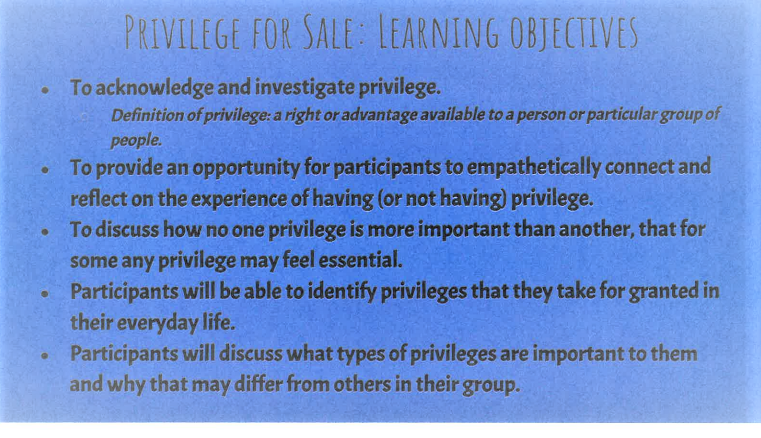
Freedom of Information Act (FOIA) documents show that Caesar Rodney School District knowingly denied the existence of a White Privilege workshop they held for teachers during an in-service day. TV Delmarva reported in depth what these teachers are experiencing.
Concord High students watched video with CRT concepts

During Black History month, students at Concord High School watched the video The Trouble With Not Seeing Color. This video implies teachers must treat students differently on the basis of the color of their skin. This premise – the opposite of what Martin Luther King Jr. taught – serves to divide students solely on an immutable characteristic – CRT in essence.
To say you have no control over the outcome of your life is demoralizing to Blacks and other minorities.
Brandywine School District adamantly denies teaching CRT.
